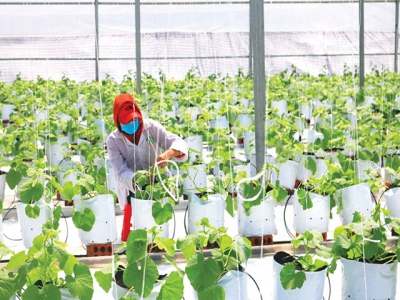EVFTA helps advance domestic agriculture

Despite also including barriers and regulations, the EU-Vietnam Free Trade Agreement will benefit Vietnamese agriculture, with businesses supporting farmers to cash in on new opportunities from the deal.
Bayer’s innovative technologies guarantee sustainable agriculture.
After being adopted by the EU Parliament last Wednesday, the EU-Vietnam Free Trade Agreement (EVFTA) will have to get ratified by the European Council and Vietnam’s National Assembly.
After coming into force, the EVFTA will reduce trade tariffs for goods such as coffee, pepper, and honey to zero.
Additional tariffs for seafood and forestry products will be reduced by 50 and 80 per cent, respectively. In addition, the EU also commits to apply zero tariffs to 80,000 tonnes of ground and unground rice per year in the beginning. After three to five years, the tariffs for rice products will be completely removed.
Pham Thai Binh, general director of Trung An High-tech Agriculture JSC, a company in the Mekong Delta city of Can Tho said, “So far, we have exported rice into the EU with additional tariffs of 5-45 per cent. This is one of the biggest hurdles for expanding our exports for us.”
Nguyen Tien Vuong, deputy general director of Hapro Mart under BRG Group, said that the EVFTA was a chance for his group to push exports into the EU. BRG’s export turnover into the EU values $20 million a year, 33 per cent of its total export volume.
“With these many trade tariffs removed in the first few years, the EVFTA helps us increase our competitiveness by adjusting our prices and widening our target market. Besides this, it also helps diversify sources of goods in our retail system serving the domestic market,” he said.
According to these local companies, the agreement with its high requirements regarding food safety and quality will urge producers to make use of advanced technologies and improve their management capacity.
However, Vuong also said that the EU is a demanding market with tightened rules for food safety and hygiene.
“While the tariff barriers will be removed, it is likely that the non-tariff barriers of some countries will be raised, and rules of origin are difficult to meet,” Son added.
Meanwhile, Weraphon Charoenpanit, country head of Crop Science, Bayer Vietnam, said that Vietnam has become the EU’s second trading partner through an FTA in the region after Singapore.
“The EVFTA will bring numerous advantages to not only by attracting foreign investors but also by giving the Vietnamese society access to a range of high-quality products,” he said.
Since its debut in the country 26 years ago, German-backed Bayer has accompanied Vietnam in its sustainable development projects and implemented many solutions to support local farmers and the whole agricultural sector.
“It has been more important for European enterprises and Vietnamese producers to come together, learn from each other, and help develop a world-leading agriculture sector in Vietnam with safe, certified, and traceable produce,” Charoenpanit said.
The majority of Vietnamese farmers work on less than one or two hectares, accounting for 70 per cent of the consumption of agricultural production.
Bayer has brought its digital solutions to enhance farmers’ technical capabilities to optimise their cultivation methods and achieve higher yields, quality, and profits.
Furthermore, within the Rice Value Chain co-operation programme between Bayer and Trung An, both jointly promote the local application of unmanned aerial systems in agriculture and provide customised plant protection services to help improve cultivation capacities and control residues in high-quality rice production, which is primarily targeted at export markets.
The pilot project has been implemented at Trung An’s 200-hectare farm in the Mekong Delta province of Kien Giang since last May and will last two years.
Bayer is also working on other joint projects with key stakeholders to develop Vietnam’s agriculture sustainably.
“As a world-leading agriculture company, Bayer has the mission to set standards for sustainability,” Charoenpanit said.
According to Charoenpanit, the company’s innovative technologies will contribute to professionalising farming and agriculture while increasing its attractiveness for the younger generation.
On the global level, Bayer has invested more than €2.3 billion ($2.49 billion) annually in agricultural research and development to help farmers enhance their productivity, create new values, and reduce the use of required input resources.
In Vietnam, Bayer’s activities help to increase agricultural productivity in a sustainable manner as well as contribute to keeping the country’s agriculture competitive in international markets.
Meanwhile, fellow German group BASF is also actively co-operating with Vietnamese farmers and provides modern solutions such as the Xarvio Scouting, a digital tool to identify weed and diseases, and receive product recommendations.
Last year, the company trained more than 15,000 Vietnamese farmers in food safety and supported around 50,000 farmers with technical issues.
Related news
 An alternative to biofloc shrimp production?
An alternative to biofloc shrimp production? A patented shrimp production system designed for use in in recirculating aquaculture systems (RAS) may increase shrimp survival rates compared
 Agricultural sector should aim at value chain, official export
Agricultural sector should aim at value chain, official export Chickens were ready for slaughtering but the collecting price dropped by 50 percent compared to before; the prices of vegetables and fruits
 Vietnam rice exports seen up 6% this year to 6.75 million metric tons: food association
Vietnam rice exports seen up 6% this year to 6.75 million metric tons: food association Vietnam expects to export 6.75 million metric tons of rice this year, up six percent from last year, Vietnam Food Association Vice Chairman Do Ha Nam